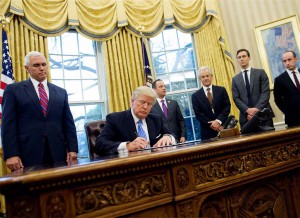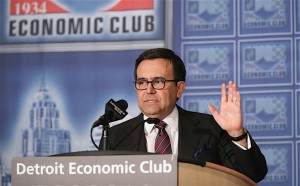
President Donald Trump is discovering that getting a new version of NAFTA negotiated will be more difficult than simply signing an executive order.
Despite tangling with both Canada and Mexico in recent weeks, President Donald Trump appears to again be shifting direction over the North American Free Trade Agreement, the White House late Wednesday indicating it will no longer seek to eliminate NAFTA but rather find ways to make it more favorable to the U.S.
That shift may not play well with Trump loyalists who have roundly opposed free trade agreements and, in particular, sought a wall and tariffs to seal off Mexico. But it is receiving a warmer welcome in the business world, especially the auto industry, where North American borders have become completely porous in recent decades, raising the specter of major problems for manufacturers who routinely move parts and vehicles back-and-forth between the U.S., Mexico and Canada.
“As the biggest export sector, U.S. auto companies need trade policies that open markets, while ensuring a level playing field in the markets to which we export. The integrated North American market is important to our global competitiveness,” American Automotive Policy Council said in a statement.
The AAPC represents Detroit’s Big Three. But other industry groups representing foreign-owned automakers, as well as dealers, have also come out strongly in opposition to calls to eliminate NAFTA and enact import tariffs.
“A withdrawal from NAFTA would severely undermine U.S. competitiveness and our ability to export product from the United States and we are very hopeful that the administration will improve and modernize the agreement in ways that builds on North America’s success as a manufacturing powerhouse and helps us stay competitive globally,” the AAPC said.
However, the “Border Adjustment Tax,” which at one point seemed to have been a centerpiece of the administration’s effort to rectify what it saw as the imbalance of trade between the U.S and its principal trading partners, such as Canada, Mexico, China and the European Union, apparently is not part of Trump’s new tax plan. The tax on imported goods was described at one point as a way to pay for additional tax cuts.
(Mexico trade chief says NAFTA redo must benefit everyone. Click Herefor the story.)

Mexico's top trade official Ildefonso Guajardo says that any renegotiation of NAFTA must benefit all the parties.
Since taking office Trump has invited scores of corporate executives to the White House to solicit their opinions and the border adjustment tax, which appears to have been buried under the weight of adverse comments from a wide variety of consumer-oriented companies and trade groups, including the National Automobile Dealers Association, which has been outspoken of foe of any levy on vehicles imported into the U.S.
Meanwhile, the Republican-led Congress has re-acted coolly to the administration’s appeals to re-open negotiations on NAFTA, which is perhaps one of the key reason Trump is now threatening to use executive order to pursue an update to NAFTA.
But Canadian and Mexican diplomats have cautioned that NAFTA’s legal foundations are rooted in legislative actions in all three countries thus difficult to undo by executive order.
In a revealing article published by the Toronto Globe and Mail, Wilbur Ross, the new U.S. Secretary of Commerce, expressed dismay at the “go-slow” attitude of American lawmakers.
Ross told the Globe and Mail the foot-dragging in launching the renegotiating process is detrimental to the United States.
(Click Here for more about Mexico warning Trump about border tax talk.)
He added the U.S. Congress has been slow on two fronts: in confirming Trump’s new trade czar, and in approving the formal notice that would launch the 90-day process before negotiations can start.
“It’s been frustratingly slow,” the commerce secretary said in an interview Sunday with Fox. “They’ve been very, very slow on completing the hearings and voting on our new U.S. trade representative Bob Lighthizer. That’s not been helpful.”
He said he had also hoped to get the formal 90-day notice done before the two-week Easter break. It didn’t happen.
One reason is a misalignment of priorities. For Trump, updating NAFTA is a major campaign promise — but for many lawmakers, who must be consulted by law in negotiations, and who eventually would vote on the deal, NAFTA was neither a campaign promise nor a top priority.
Even the top lawmaker on trade-related files, the head of the Senate finance committee, Orrin Hatch, recently told reporters his main focus at that moment was getting Supreme Court pick Neil Gorsuch confirmed. The judge is now confirmed, but there’s another priority for Hatch, and for Congress, which likely supersedes NAFTA: comprehensive tax reform.
The administration still doesn’t have a trade czar to deal with Congress.
Lighthizer’s confirmation is turning into a bargaining chip. Because Lighthizer might need a congressional waiver to join the U.S. government, given past legal work for foreign countries, Democrats want something in return. In exchange for confirming the trade czar, some are demanding coal-miner pension guarantees in an upcoming fiscal bill, the Globe and Mail said.
Ross, who is quite familiar with NAFTA’s fine points since he owns automotive supplier that makes parts for vehicles made in Mexico and exported to the U.S., has expressed a desire to get the deal done within a year.
Each of the three countries will enter election mode, one after the other: Mexico votes in just over a year; then the new Mexican government doesn’t get sworn in for another five months. By that point, American lawmakers will be distracted by their own midterm elections in late-2018. Then Canada has its federal election a year later.
(Trump threatens Canada, Mexico, with new border tariffs. Click Here for the story.)
“Bad trade deals shouldn’t be allowed to sit,” he added Sunday. “The longer they sit there the more they are to our disadvantage. So it’s quite unfortunate the way Congress has been working has been to slow-walk these activities.”
